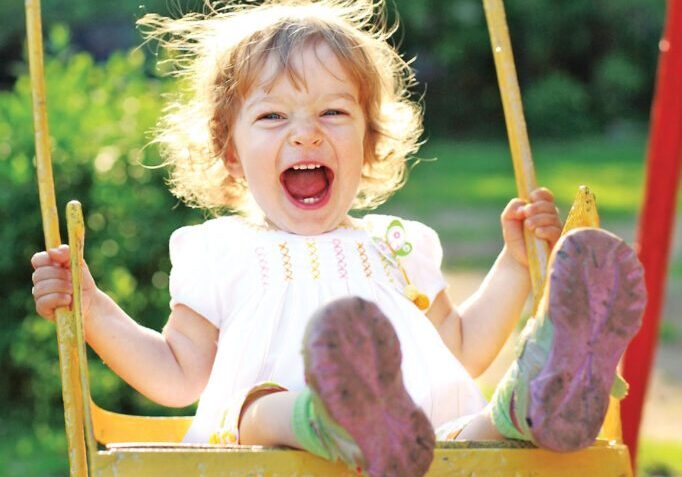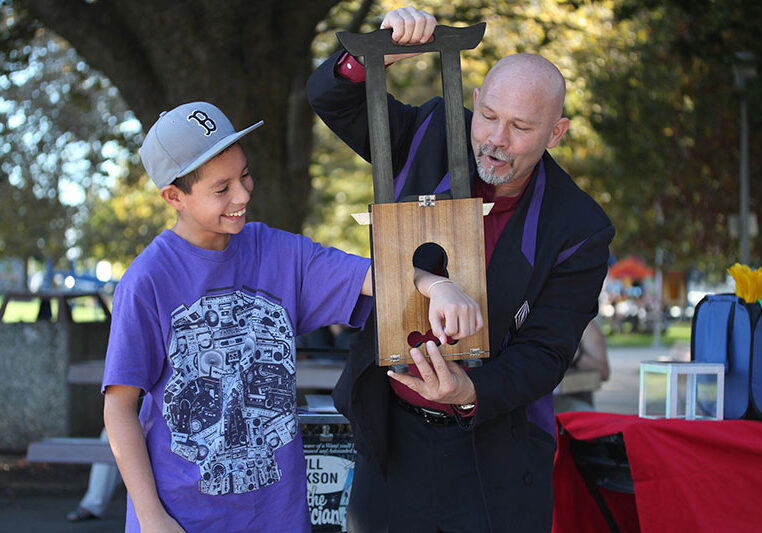A growing number of families with young children are caring for an aging relative. Whether it’s temporary care following surgery, or longer-term care due to a debilitating condition, more and more families find the best option for caring for aging parents is to invite them into their home. How can families ease the transition and help young children adapt to the changes in their household?
Your kids probably fall into one of two categories. Children who have developed a relationship with their grandparent may be upset by the changes they see in the person they love. Others, due to today’s mobile society, may consider their grandparents near-strangers.
Either way, don’t push the bonding. Avoid pressuring Grandpa to join you on your walk or to play video games; ask but don’t cajole. Likewise, don’t force your child to interact with a grandparent. Require respectful and polite behavior, but your child doesn’t have to sit through reruns of Lawrence Welk with a grandparent.
“Families need to let go of preconceived ideas of what the relationship between grandparents and grandchildren will be,” says Shelly Edwards, outreach and program director for the Alzheimer’s Association of Oregon. She describes how roles can change, such as entrusting a teenager with “babysitting” Grandma, rather than Grandma babysitting the grandkids.
Discuss the grandparent’s condition in terms your child can understand. Will aspects of the grandparent’s condition upset your child? How can you explain in advance what to expect? Keep talking and responding to your child’s questions as they arise.
Educate yourself and continually reassess and adjust as needed. Edwards recommends that families learn all they can about a loved one’s condition and care needs to determine whether they can provide adequate care without harming themselves physically or emotionally.
Whether the grandparent is in the home due to Alzheimer’s or another condition, “it’s always good to connect with support groups in your area,” says Elaine Flores, chief operating officer of Medical Home Care Professionals, Inc. in Redding, California. “Attending meetings often leads to getting great ideas from people who are in the same situation you may find yourself in.”
Come up with a system for your family to address conflicts or misunderstandings. Keep a notebook in which older children can write concerns, perhaps anonymously, to be reviewed later and to allow parents time to find solutions or answers to questions.
“Being able to have conversations with children about the progression of their loved one’s disease is key,” says Rick Little, behavioral health nurse with Medical Home Care Professionals. “The progression of dementia, Alzheimer’s and traumatic head injuries can significantly change someone’s personality, demeanor and character. Children are very sensitive to these changes and will look to a parent for support and direction. Dialogue about the changes they are seeing in their grandparent, and that it’s not their grandparent’s intent to act or behave in this way.”
Create a family check-in time when kids can talk freely. This may mean out of earshot of the grandparent. Ask kids what is bothering them and be prepared to listen without judgment. Pose questions: Is anything bugging you? Are you worried about anything? What is working especially well? What do you think we could do differently? Life isn’t fair, but is there anything going on that strikes you as particularly unfair right now, for yourself or for someone else?
Work together to establish rules for use of communal space and needs for privacy. Children can be taught to knock before entering a grandparent’s room. If a grandparent tends to wander and takes something from a child’s room, let the child know it’s OK to gently and respectfully let the grandparent know the item belongs to him, and while in many cases the grandparent can play with or use the item, the child can ask his grandparent when it will be returned. “Educating our children on how to respectfully and politely engage with their grandparents will help children feel like they are part of the solution and will generally lead to a calmer home environment,” says Little.
Children need to learn to be flexible and accommodating, but if Grandma’s presence brings all regular pursuits to a halt, kids will become resentful. If it becomes necessary to reduce the number of activities your kids are involved in, avoid using the grandparent as the primary excuse.
Compassion grows in children who feel loved, secure and nurtured by others. As caregiver to your own parent, you’re setting an admirable example for your children, but don’t forget to take time to laugh and have fun with them. Take care of yourself and be sure your kids know they are safe and loved during this transition, however long it lasts.
10 Simple Steps for Relieving Caregiver Stress
Caring for a parent while raising children can be incredibly stressful. While meeting everyone else’s needs, be careful not to neglect yourself.
- • Take time, even 10 minutes a day, for yourself. Breathe slowly and allow yourself to relax.
- • Identify one pleasurable thing that you can do for yourself this week – something you want to do, not something you feel you should do.
- • Share your story to let those around you know what you are going through and ask for help.
- • Learn to say no, for now, to other responsibilities.
- • Spend one-on-one time with your spouse and with your children.
- • Join a support group.
- • Make time for exercising and eating right.
- • See your doctor. Caregivers often neglect their own health, skipping regular wellness exams and ignoring symptoms.
- • Seek respite support from a home care or home health agency, your local hospice organization, a recommended custodial care aide, or ask friends, neighbors or relatives for help and support.
- • Hire a housekeeper to help keep overwhelm at bay.
Comment Policy: All viewpoints are welcome, but comments should remain relevant. Personal attacks, profanity, and aggressive behavior are not allowed. No spam, advertising, or promoting of products/services. Please, only use your real name and limit the amount of links submitted in your comment.
You Might Also Like...

The Kind of Mother I Am
Inevitably my 18-month-old daughter will fall at the park. I will not try to catch her. On a typical day, my daughter will ingratiate herself with the kids whose mothers […]
This Season’s Harvest Happenings
Autumn is a perfect time to begin or continue a traditional visit to harvest happenings in our region. Pumpkins, colorful gourds and winter squash all provide a cornucopia of color, […]

The Benefits of Eating Locally
Could You Be a More Locavore Family? Want food that tastes amazing? You can’t beat local, in-season food. Other benefits of eating locally include eating more real food, knowing where […]

Shasta Community Maternity Center
A Warm Hug of Services The healthcare team at Shasta Community Maternity Center wants every woman to feel as though she’s wrapped in a warm hug of quality services each […]


